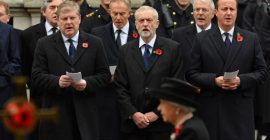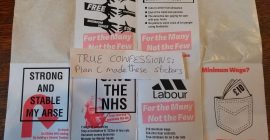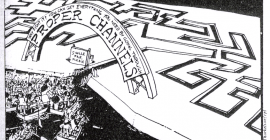A week on from Labour’s resounding defeat in the UK General Election, Plan C London member Nik Matheou reflects on the Corbyn moment’s passing, the role of the institutional and autonomous Lefts, and the potential for building a broad-based socialist movement beyond electoralism. In this moment of electoral defeat, it’s important not to fall back on easy dogmatism and sectarianism, and for all parts of the Left to remain firmly humble in their analysis and proposals for next steps.
We’re hurting. Many Plan C members, alongside our friends and comrades from across the parliamentary and extra-parliamentary socialist spectrum, gave so much to the Corbyn moment, only to see what appears the dawn of a newly reinforced Tory hegemony. This is far from what we struggled and hoped for. We’re hurting, we’re despondent.
But this too will pass, and when it does the task will remain the same: organise a movement able to struggle for a free, equal and democratic society, a society able to administer itself beyond the domination of capital and the nation-state, through direct democracy, gender liberation, social ecology and a cooperative economy. In short, organise a movement able to build free life for everyone, everywhere. That’s the grand old idea of socialism in its broadest understanding, whatever particular tradition you’re part of, whichever school of anarchism, communism or state socialism you follow, and it’s still as powerful and necessary as ever. However important in defining the conditions of struggle – and to be sure, they’re certainly important – projects for state power are necessarily only one, limited part of this process, and with this result their positioning in the overall movement needs to be thought through clearly, and without dogmatism.
Plan C falls on the autonomous and libertarian side of the socialist spectrum, the part that views the existing state as a problem to be overcome in struggle rather than a tool to be used. The existing state may be a terrain of struggle like many others, but it’s one with very particular characteristics that foreclose any real potential to create a free, equal and democratic society through its structures, especially from the central state apparatus. Where we maybe differ from other parts of the autonomous and libertarian Left, however, is in seeing this principle as subject to history: the question of where and how to intervene in state institutions is one of when, not whether. We assert a tactical and historical understanding of the principle: ‘There are no Leftist governments, only governments that make more or less space for the Left’.
The Corbyn moment revealed itself as a ‘now’, and we began to ask ‘where’ and ‘how’ – and came up with lots of different answers. With last week’s defeat this moment has passed, and, when the initial mourning is done, the time to evaluate will come: should we have attempted to organise a libertarian socialist tendency within Labour, or should we have more emphatically positioned ourselves as the autonomous ‘Left-of-Labour’ grouping? To radicalise the Corbyn moment was it more important to endorse Labour, or to remain antagonistic? Is the purpose to radicalise the Labour movement itself, or to bring newly mobilised people into active autonomous politics? To what extent was the moment an opportunity, with regrouping taking place inside Labour, and to what extent a new problem, reducing our capacity and autonomy? At different points in the Corbyn moment Plan C, alongside many other organisations and organisers, gave different answers, and these concrete responses as well as many more questions are crucial to critically examine – insofar as they can inform our practice in this next phase.
But they can’t be approached with the same hackneyed Left sectarianism that appeared once again within minutes of the exit poll last Thursday. No one quite believes in the caricatured messiahs of the institutional and autonomous Lefts, yet somehow they remain implicit in our arguments. On the one hand is a leader able to win elections and implement socialist policies, on the other a moment in time, The Revolution, that appears all at once, and creates a clearly identifiable ‘Bad Capitalist Before’ and ‘Good Socialist After’. No messiahs have yet appeared, and while superficially all socialists recognise these caricatures as exactly that, many responses to last Thursday ultimately rest on their assumptions about where and how “real” change happens. If we claim to already have, then we need to re-learn again the lesson of lifelong revolutionaries such as Angela Davis, Abdullah Öcalan and many more: the struggle is constant, and necessarily happens across multiple terrains – but as much as no victory is truly final, neither is any defeat.
There’s a phrase that stuck from this year’s The World Transformed: ‘solidarity is what love looks like on the streets’. So, at this frustrating, aggravating and depressing moment, we send all our love to all our comrades, from the most dogmatic anarchists, to the most starry-eyed Corbynistas. It’s rarely said, but each of our decisions on where to commit our limited time and energy for political organising over the last four years – from the Labour movement, to TUC, base and community/tenants unions, to autonomous organisations and extra-parliamentary campaigns of different form and purpose – all represent different but integrally necessary parts of an overall movement really able to abolish the present state of things, and build a democratic society beyond capital, patriarchy and the nation-state.
Likewise, none of us, in any parts of the institutional or autonomous Left, have yet squared the circle of how to configure this integral movement, how to draw on the best by criticising the worst of all of our organising, how to approach the weighting of different institutional and autonomous terrains of struggle, and so how to balance each different necessity in a real transformative thrust. If the autonomous Left hasn’t yet been able to massify, then the institutional Left hasn’t yet been able to organise practically beyond election cycles; if the institutional Left can provide immediate and absolutely necessary alleviation from capital’s domination, then the autonomous Left knows that state alleviation is temporary, predicated on displaced exploitation and domination, and in the long term a real rupture is needed. We could go on, such contradictions are countless. The point is that building the movement for a democratic society means clearly holding contradictory truths in mind, and working through them directly.
As we regroup, then, and begin the hard and serious work of figuring out how to configure this movement, we need to maintain our socialist principles – which, needless to say, is not the same as repeating dogmas. We need to identify the contradictions uniting and dividing all of us in the potential movement for a democratic society, and to criticise and work through these. Maybe most importantly, each of us must stay firmly humble in working through the failures of the different parts of the institutional and autonomous Left during the Corbyn moment – no one cracked it.
For the moment it’s ok to mourn, but tomorrow we get back to the holy trinity of socialism: educate, agitate, organise – and maybe with a special emphasis on the first. A clear vision is needed of what socialism can mean beyond re-heated social democracy – however much a Corbyn-led social-democratic government could have provided crucial relief to working classes battered by neoliberalism and austerity. This vision must be able to articulate the 2017 and 2019 Labour manifestos’ exciting policies, in a coherent image of a freer, more equal and, crucially, more dignified life. Superficial markers like The World Transformed’s SOCIALISM sign, and Momentum’s ‘countdown to socialism’ campaign site, have been important for puncturing Queen Tina’s refrain, ‘There Is No Alternative’, but now much more is needed: a vision for socialism that recognises it can’t be voted in – and, on the other hand therefore, can’t be electorally defeated.
Similarly we need a clear vision of immediate organising goals that match up to this longer term vision of a free, equal and dignified life – and all parts of our potential integral movement are necessary for both the long-term vision, and the immediate goals. When ‘we’ set about this task, therefore, it’s important to remember who ‘we’ are: not a revolutionary Royal We acting at the level of the state, but organised and organising militants, sometimes able to make empowering social forms, but always at the human scale. Seeing ourselves as social beings living our everyday lives, the question of ‘electoralism or not’ is transformed by a refusal of statecraft’s autonomy of the political. Instead the question becomes: as socialists of various stripe who want to produce a radical transformation, where are our energies best spent?
It’s too soon, and would be far too arrogant, to give firm answers to this question. They will emerge from our concrete practice, and the base and organizational ecology established during the Corbyn moment. The FCK BORIS platform is one example of an antagonistic but life-affirming and joyful initiative from the autonomous Left that engages on the institutional terrain, and many more potentials were shown at The World Transformed this year – so the launch of Labour Transformed this weekend seems particularly promising. After less than a week already new anti-union laws have been signalled, making it an urgent task to join and defend TUC unions – if possible double carding with a base union like IWW, UVW and IWGB. Another promising sign is the rush of membership applications to community and tenants’ unions like ACORN, Living Rent and London Renters Union, types of organisation that will be absolutely crucial in the next phase of struggle. These organisations’ importance points to the sphere of social reproduction, a key terrain in this phase of struggle that needs strategising in concert with workers’ struggle – and emphasises the central role of the liberation of women and oppressed genders in building an effective counter-hegemonic movement. With the defeat of Labour the hope of a timely Green New Deal in the UK has been dashed, so the readiness for mass action for the climate shown over the last year or so will only become more important. Finally, a discussion within and between self-described revolutionary organisations on our role is long overdue, so our comrades at RS21’s call for open meetings across the country is welcome. All of this points to the potential for an integral movement for a democratic society really able to move beyond fossilised binaries, abolish the present state of things, and build free life.
And if, while we reflect and configure this movement, we are to mourn, then it’s important to historicise as well – as we said in our pre-election statement, ‘We are part of history, and history is happening, and it’s happening everywhere, and it won’t stop whether we win or lose this election.’ As many have noted, this election can’t be separated from the long-term effects of neoliberalism, which removed the old basis for mass socialist politics in Scotland and the north of England, opening space for different forms of nationalism to separate the old socialist constituency from Labour – of course with different particulars in Scotland that have opened new potentials for radical socialist politics at the same time. This was helped along by Labour’s own commitment to doubling down on the Tharcherite consensus, and taking Scottish and northern English voters for granted. This transformation, extending across some four decades and more, and emerging from the explosion of militancy with the world-revolution of 1968, and its ultimate defeat by the neoliberal counter-revolution, could not be overcome within the bounds of the Corbyn moment.
The election, therefore, is another reminder that we’re in the middle of a terminal structural crisis in the capitalist world-system. Now is certainly the time of monsters, but this structural crisis also gives our actions a level of agency they wouldn’t have at other times: every micro moment of struggle increases the potential of realising another, freer and more equal social system than has ever existed anywhere – of creating something we can meaningfully call socialism. In the last four years, all criticisms aside and in all good faith, the Corbyn moment, driven by all those whose actions have made it up, has formed a profound addition to that potential, a dramatic rupture in capitalist realism and a reminder that another world is always possible – now, comrades, we all can build on it.









